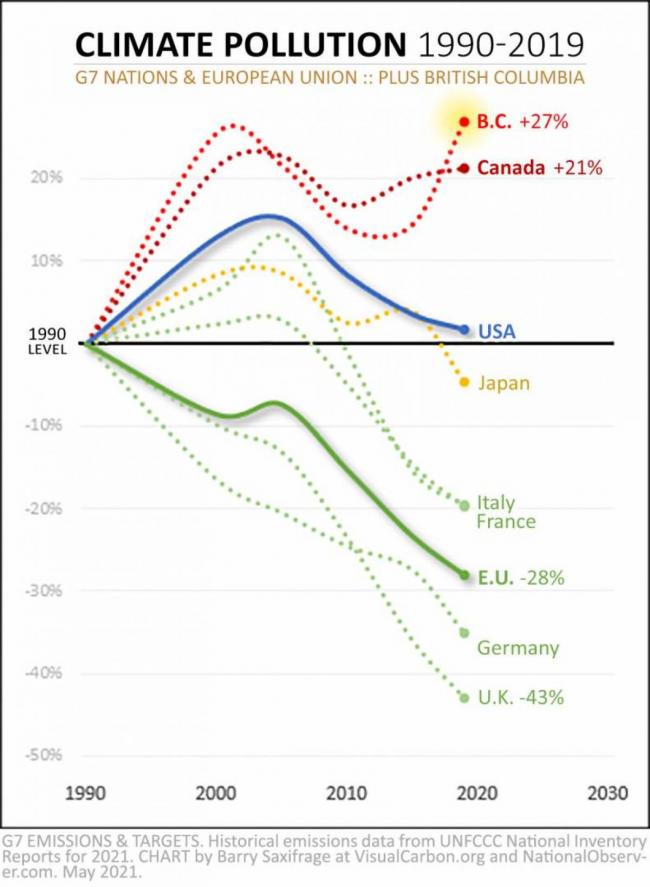New climate data and commitments shared by other nations during the Earth Day Climate Summit in April told a promising story: growing numbers of countries and regions around the world are making progress, reducing pollution and willing to do what is necessary to address the intersecting crises of climate, biodiversity, and COVID-19. Unfortunately, Canada and British Columbia are not yet part of this group.
In fact, we are laggards. Even among the G7—a group of the most industrialized nations with large per capita emissions, deep climate debts to the Global South, major historic responsibility for the crisis, and a history of dragging their feet on climate progress—we stand out. Shockingly, Canada is the only G7 country that has increased its emissions since the 2015 Paris Climate Summit.
Despite its reputation as an environmental leader, British Columbia is not doing its part to change that. Instead, the province continues subsidizing fracking, clearcutting of the last carbon-rich old-growth, building the destructive $16-billion dollar Site C dam, trampling on the rights of Indigenous Peoples, and limiting British Columbians’ ability to finance effective climate action.
Like Canada’s, B.C.’s provincial emissions have stayed consistently high. Also like Canada’s, B.C.’s weak climate targets are inconsistent with the goal of the Paris Agreement, and they are insufficient and inadequately funded.
Canada’s recent National Inventory Report shows that B.C.’s emissions have increased every single year since 2014 and reached 65.7 million tonnes of CO2 in 2019. Not only have emissions increased by seven percent compared to B.C.’s 2007 level, but they have gone up by 27 percent compared to 1990 levels (51.8 million tonnes). For comparison, the U.K.’s emissions are now 42 percent below 1990 levels and the country is now aiming to reduce emissions by 78 percent by 2035. Even in the U.S., emissions have decreased in recent years despite the Trump administration.
This record in B.C. is unacceptable by all accounts, but especially so considering that global emissions must now fall by more than seven percent per year to avoid catastrophic climate change according to the UNEP Gap Report.
The good news is that the B.C. government is still capable of rising to the occasion, not only in terms of emissions reductions but also toward funding a just transition for workers and communities. Unfortunately, we are squandering this opportunity by spending billions on megaprojects like LNG Canada, Coastal GasLink, and the Site C dam, keeping failing fossil-fuel companies afloat while investing in the false promise of fracked gas. The money spent on propping up the industry is urgently needed to transition our communities safely, equitably, and quickly toward a zero-carbon future.
When it comes to investing in a just transition, there is overwhelming evidence that cutting our losses and investing the money not yet spent on fossil-fuel megaprojects—which offer few long-term jobs—would create many more permanent jobs in sectors that have a long-term sustainable future.
We also have a huge opportunity to use a portion of these subsidies to restore lands instead of destroying them. B.C. is home to some of the tallest and most carbon-rich forests on the planet, but the province’s current climate action plan ignores massive uncounted forest emissions caused by clearcutting and slash burning.
Protecting old-growth forests and reforming forestry across the province to safeguard ecological integrity and biodiversity, as outlined in the 2020 old-growth panel report recommendations, would not only reduce carbon losses, it would allow us to sequester more carbon from the atmosphere.
But despite Premier JOhn Horgan’s promise to implement all of the panel recommendations, old-growth logging continues unabated, talk-and-log prevails, and the recent provincial budget doesn’t include funding to support communities and First Nations that seek to protect their last old-growth.
Meeting science-based targets will require true political leadership. But from closed-door meetings with corporate executives to continued investment in dangerous fossil-fuel projects and clearcutting old-growth, the B.C. government is sending a clear signal that it still prioritizes short-term industry profits over a climate-safe future. This moral failure must end now, because British Columbians have consistently shown that we want to be part of the global community that cares about leaving a better world for future generations.

